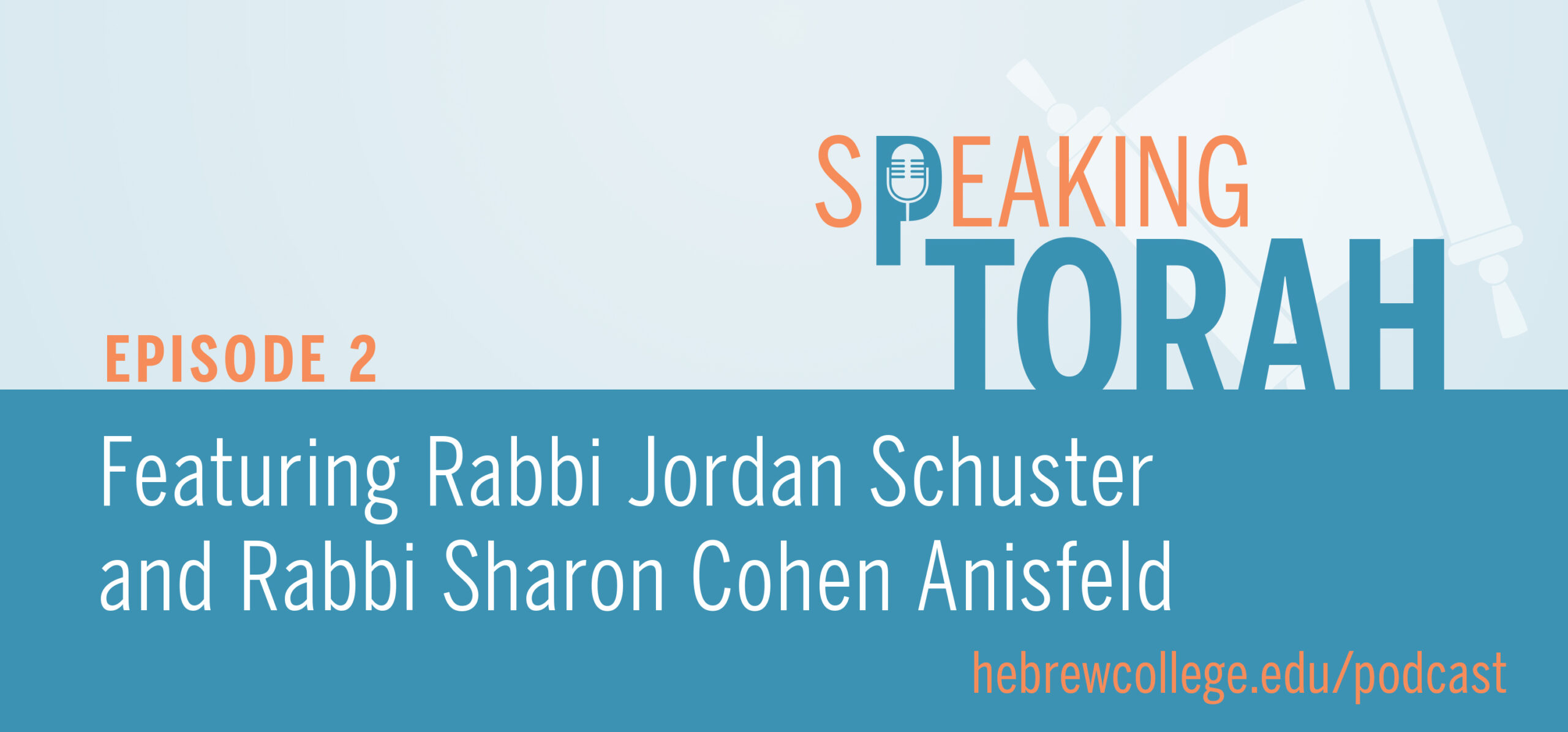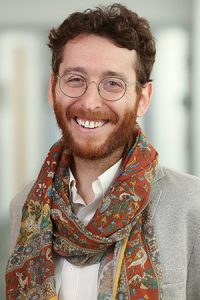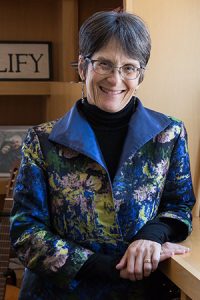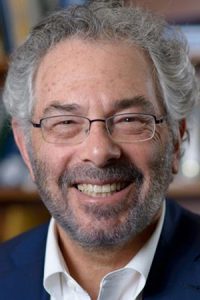Podcast Ep #2: Vertical Ladders of Sky, Horizontal Ladders of Earth

I just love the spiritual sensibility that’s reflected here, one that is, itself, grounded on Earth, but reaches beyond. And one that doesn’t overreach, doesn’t claim to know more than we can know, one that’s in love with the aching complexity of the human experience, but also insists that there’s something beyond, that there is a transcendence that touches our existence and tugs at us in ways that are both mysterious and palpable.
– Rabbi Sharon Cohen Anisfeld
In this episode of Speaking Torah, Rabbi Jordan Schuster explores the connection between John Keats and the story of Jacob’s Ladder, and teaches that regardless of how fissured this world feels, ladders, like bridges, hold the possibility for connection and relationship.
Can a single person actually confront and repair really difficult relationships without having a support system? Yes. However, help makes for lighter work. And in this essay, Jordan reflects on Keats’ desire to escape the world up the ladder, versus Jacob’s desire to use the ladder to foster unity in the human world, and Jordan’s own desire for our communities and institutions to play a role in this work.
Reading Jordan’s work, we have Rabbi Sharon Cohen Anisfeld, President of Hebrew College. Sharon is passionate about inviting her students to be creative participants in the ongoing dialogue through which Torah is revealed and renewed.
What You’ll Discover from this Episode:
- Jordan’s multi-faceted interpretation of The Ladder and the link between the perfect, and the imperfect, the human, and the divine.
- How Jordan incorporates the voice of Jacob, Rashi, and John Keats to perfectly illustrate his interpretation of The Ladder.
- How a cynical nihilistic understanding of the world will result in troublingly transcendent theologies.
- Why The Ladder doesn’t only serve as a vertical metaphor to connect us with the divine but has the ability to link us with all of humanity and the demons within us.
- The relevance Jordan’s essay has today around rebuilding difficult relationships and the power of structures that enable us to work together.
Listen to the Full Episode:
Listen on Apple Podcasts | Stitcher | Spotify
Featured on this Episode:



A special thank you for this episode’s musical contributions:
Intro by: Jackson Mercer
Jackson is an Ordination Candidate at the Rabbinical School of Hebrew College in Newton, MA. He grew up at Congregation Rodef Sholom in San Rafael, CA where he cultivated a love of Judaism, embolden with music, spirituality and justice.
Esa Einai (Psalm 121:1)
Music by Jackson Mercer
Guitar and Melody by Jackson Mercer
Harmonies by Cantor Rosalie Will, Ilana Sandberg, Rabbi Micah Shapiro, Rabbi Josh Warshawsky, Noah Diamondstein, Ryan Leszner, Eliana Light.
Outro by: Rabbi Arielle Rosenberg
Rabbi, Shir Tikva, Minneapolis, MN
Rabbinic Ordination: Rabbinical School of Hebrew College 2017
Psalm 116 from the album Galeh: Tenth-Anniversary Celebration of the Rabbinical School of Hebrew College
Composed by Arielle Rosenberg, with Arielle Rosenberg (vocals), David Fainsilber (hand drum), Micah Shapiro (tambourine), and Becky Wexler (clarinet).
Welcome to Speaking Torah. I’m your host Rabbi Jeffrey Summit, Director of the Innovation Lab at Hebrew College. In this podcast, leaders from Jewish communities around the country read essays by Hebrew College Rabbis. These essays tackle the pressing issues of our world in need to healing and hope, with Hebrew College’s signature compassion, creativity, and relevancy.
This week, Jordan Schuster explores the connection between John Keats and the story of Jacob’s Ladder, and teaches that regardless of how fissured this world feels, ladders, like bridges, hold the possibility for connection and relationship.
Rabbi Jordan Schuster was ordained at the Rabbinical School of Hebrew College in 2018 where he currently teaches courses in Mishna, Tanach, and Hasidot. We asked Rabbi Sharon Cohen Anisfeld, President of Hebrew College to read Jordan’s essay.
Sharon became president of Hebrew College in July 2018 after serving as Dean of the Rabbinical School from 2016 to 2017. Previously a Hillel Rabbi at Tufts, Yale, and Harvard, and a faculty member for the Bronfman Youth Fellowships in Israel, Sharon is passionate about inviting her students to be creative participants in the ongoing dialogue through which Torah is revealed and renewed.
Now, here’s Sharon reading Jordan’s Essay, Vertical Ladders of Sky, Horizontal Ladders of Earth.
—
I’ve been thinking about John Keats lately. About how he died at the age of 25. About how so much of his life up to that point was spent contemplating a way out of this world. Beauty, imagination, sleep, these were his exits and escapes. These were the paths he used to transcend reality, to free himself from the cruelty, the violence, the brokenness of this world.
He writes in his Ode to Sleep, “O soft embalmer of the still midnight. Shutting with careful fingers and benign our willing eyes. O soothest Sleep, save me from curious conscience. Seal the hushed casket of my soul.”
Keats is praying to sleep here. He is beseeching and commanding sleep to shut closed his eyes, to save him from consciousness, to seal his soul off from the darkness of the world. And Keats issues these prayers because, as he describes elsewhere, to fall asleep is to lift the soul up into the light of heaven. To fall asleep is to drift into an embrace of pure beauty. While to wake up – to wake up for Keats means plunging from a vastness of sky into the muddy stream of real things.
In Parashat Va-Yetze, Jacob shuts his eyes to the world and enters into a dream. Just as sleep offered Keats respite from the dark and shattered reality, so it seems initially to offer Jacob the same. After all, as our Parsahah opens, we find Jacob absconding from his life; fleeing from a murderous brother, a fractured family, a disintegrating home. Existential threat looms up around him. Deceit and treachery come to define the world as he knows it. Sun sets. Darkness falls. Reality pitches into night. Jacob quails, climbs a mountain, lays his head upon a pile of stones, drifts at last into sleep.
Here is what he sees. And behold, a ladder standing on earth, its head touching the sky. And behold, messengers of God ascending and descending upon it. And behold, Adonai stationed upon it. Out of the darkness of his world, Jacob watches a ladder grow; luminous, vertical, brushing its crown against the altitude of heaven.
If Jacob were Keats, he would clamber up that ladder, never to return. He would escape into the sky and attempt to linger there with God, gazing upon the clear space of ether, Jove’s large eyebrow, the noise of harmony.
He would contemplate these immaculate forms of beauty; perfectly proportioned, sublimely untouched by the world. He would sacrifice his existence to them. He would let go of his being alive, just in order to remain with them.
Not Jacob. Jacob is decidedly not Keats. When Jacob beholds a ladder spanning out between heaven and earth, what seems to compel him most is not what stands at the other end of the ladder. Rather, what seems to compel Jacob most is the sheer fact that such a ladder exists, binding the aching complexity of this world to the starlit transcendence of a world beyond.
What seems to compel Jacob most, in other words, is the way his ladder helps him to identify an inextricable connection between the imperfect and perfect, the human and divine, our world and God’s. Jacob’s ladder teaches Jacob about how entwined heaven and earth actually are.
The Tanakh’s presentation of Jacob’s ladder as a bridge that links worlds together is stunning. But perhaps even more stunning is what Rashi does to the image. The foot of Jacob’s ladder stood in Be’er Sheva, its middle slanted into Jerusalem, its head was in Beth El.
Instead of seeing Jacob’s ladder as vertically stretching out from earth to sky, Rashi rotates it by 90 degrees. He spins it on its side. And as a result, it no longer serves to link this world to the next, but this world to itself.
If Keats’ ladder offers an escape into a realm of Divinity, if the Tanakh’s ladder scores Divinity as being indissolubly linked to our own world, Rashi’s ladder surfaces how even the most ruptured of relationships are still somehow connected.
As much as Jacob tries to run away from his brother, his family, his home, his past, Jacob’s ladder reveals to him how profoundly he remains bound to them, how inevitably they remain bound to him. Regardless of how fissured his world feels, Jacob’s ladder helps him to discern the ways in which – teeming beneath everything – there remains the potential for relationship. There remains the possibility of ladders – like bridges – clacking out between you and me; between me and you.
To see these connections, to illuminate them the midst of so much dark division, is to wake up, is to reconsider the world, is to exclaim with Jacob, “Yes. God is in this place. I didn’t know.”
—
Rabbi Jeffrey Summit: We asked Sharon what she liked about Jordan’s essay.
Rabbi Sharon Cohen Anisfeld: I think one of the things that I love most is simply the way that Jordan writes and the way that he thinks. And in particular, the way that he weaves together such a breadth of voices. In this case, the way that he weaves together John Keats and Rashi and his own insights into both of them and into the biblical text.
Obviously, his erudition is very impressive. But it’s so clearly not there to impress. It’s there I think because these are genuinely some of the many voices in his inner Beit Midrash. And one gets the sense that there is just this wonderful way that Keats and Rashi and the text of Genesis all neat within him for a conversation that transcends time and space and is then distilled through the powerful depth of his own insight and the searching of his own heart. So, this for me is really what it means to be part of the living process of interpretation that is Torah. And Jordan does it so beautifully and so magnificently.
Rabbi Jeffrey Summit: Here’s what Sharon had to say about what spoke to her most.
Rabbi Sharon Cohen Anisfeld: I think the part of the piece that captivated me the most that really – I can always tell because it’s the part that makes my heart pound. The part that I was really drawn to is the part where he’s talking about the theme of the relationship between the imperfect and the perfect, the human and divine.
And in particular, the moment where he first contrasts Jacob with John Keats and he says, “What seems to compel Jacob most is the sheer fact that such a ladder exists, binding the aching complexity of this world to the starlit transcendence of a world beyond.” So, I just love the spiritual sensibility that’s reflected here, one that is, itself, grounded on Earth, but reaches beyond. And one that doesn’t overreach, doesn’t claim to know more than we can know, one that’s in love with the aching complexity of the human experience, but also insists that there’s something beyond, that there is a transcendence that touches our existence and tugs at us in ways that are both mysterious and palpable.
One of the things that I love most about his interpretation of The Ladder is that he allows it to mean more than one thing. And that he does something which I appreciate in general in relationship to metaphor, which is to allow it to breathe and to not try to beat it into submission and make it mean just one thing.
And the other thing that I especially love is his reading of the Rashi at the end, which is really new to me. And takes us from the vertical metaphor that he explored so powerfully, that sense of connection between Earth and what is above and beyond us, to a downward metaphor, not vertical, not the connection to what is above and beyond us, but the connection to and through what is beneath us in his language, what is teeming beneath everything.
And, of course, there he takes us back to the potential for connection that is teeming beneath all of existence, which I think is a beautiful way of talking about the divine. And again, there’s an understatement to Jordan’s theological claims that makes me trust him. And that allows my heart to open to the possibilities he’s inviting us to consider.
Rabbi Jeffrey Summit: We asked Jordan, what made him write this essay.
Rabbi Jordan Schuster: Before I started rabbinical school, I was reading this long book by Mircea Eliade, who was a comparative religionist form the early 20th, mid 20th century. And in his book on shamanism, he writes about two different typologies of shamans. One is a white shaman. One is a black shaman.
And in these typologies, which are assembled from a cross-cultural study of healers, the black shaman cross-culturally tends to have, as a symbol, a vertical ladder. And in an effort to help people who have lost their souls retrieve their souls, he takes them on a journey into the sky where they, together, propitiate the celestial gods and encounter ideal forms of beauty, peace, healing, restoration.
And then they come back down to the world and exist with integrity and a sense of repair. Versus the black shaman, whose symbol is the horizontal ladder. And in this typology, they don’t ascend into the sky to contemplate supernal forms. They actually have to root around in the messiness of relationships. And instead of propitiating gods, they have to wrestle with demons. And they’re two totally different approaches to healing.
So, I think that the image of the vertical and horizontal ladder were already in my head for a long time. And I felt particularly moved, excited, stunned to encounter Rashi flipping the ladder horizontal. And I felt like I had a lot of really rich associations to it already from Eliade. So that, I think, was one piece.
Another piece is when I started teaching at Hebrew College, they gave me a class on classical Jewish thought. And it felt like such a broad subject and, quite honestly, I don’t feel like I have a comprehensive knowledge of what is in that body of literature, such that I could do a survey course.
So, I just tried to narrow down on a single topic that I wanted to talk about in classical Jewish thought. And what I ended up coming up with were rabbinic responses to Gnosticism. Gnosticism was a pop-spiritual movement that spread throughout the Near East in the classical rabbinic period, which understood the world to be corrupt, evil, dark, irredeemable. And the only way that we can actually find some sense of holiness or divinity is through transcending this world.
And in rabbinic literature, if you read it closely, it feels like the rabbis who have a whole assortment of different kinds of theologies and a whole assortment of different ways of relating to the world are constantly reacting to and against the notion that the world is evil and that the only way to have sacred existence is by fleeing this world, regardless of the reality of their theologies.
They really want people to be here and they really want spirituality, religion to be grounded in the ways in which we’re relating to things of this world. And I feel like that’s such an important thing to teach my students because I do feel like there is still a very, very powerful and seductive tendency to take a look at this world and want out.
I think it is really hard to root around like a black shaman in the demons of relationships and figure out how to negotiate with them, the demons in us, the demons in others. I feel like it’s really hard to be here in a dark world and in part the secret agenda. The hidden agenda, but also not so hidden agenda of that class is to help students develop not only a framework and a language through which to understand how a cynical nihilistic understanding of the world will result in troublingly transcendent theologies. But that we have a whole tradition of rabbis behind us who are gently urging us to stay here and to help our communities and help ourselves figure out the spiritual tools we need in order to stay here.
So, it was out of that that the essay flowed. I think the reason that I end up using Keats as my Gnostic strawman is because in October and November of 2018, my partner had just gotten a job where he had to leave the house at 5am every morning, so I was up before sunrise and I was looking out the window and it was so dark and the world felt very dark. And in a non-rational way, I just pulled Keats off my bookshelf and kept reading and reading and reading every morning. It became a kind of strange spiritual practice.
And even though something in me was magnetized to Keats and felt like I really needed to understand him, and moreover, swim around in the richness of his imagery. Another huge part of me was aware that it’s that kind of thinking the rabbis were really scared of.
And I loved that as a spiritual practice. On the one hand, finding incredible comfort and solace in Keats’s work, and on the other hand recognizing that an hour later after the sun rose, I would have to go and teach a class about rabbinic responses to Gnosticism. It was a really salubrious tension, I think. It felt healing.
It felt healing to get Gnosticism, feel drawn to Gnosticism, and then look at myself in a community where we were creating the kind of relationships, the only kinds of relationships that can actually ground us enough in this world to keep us from surrendering to Keats, surrendering to the Gnostics.
Rabbi Jeffrey Summit: Here’s what Jordan had to say about the essay’s relevance to today.
Rabbi Jordan Schuster: When I reread the article today, I realize that there has been a significant shift over the last two years for me, most specifically around the way in which the Tanakh and Rashi imagine Jacob having to do the work of inverting the ladder alone. Can a single person actually confront and repair really difficult relationships without having a support system?
And I think yes, but I also think so much help is needed. And when I read the piece now, as a result of actually working within the context of an institution for a year and a half, I realized how important institutions are in creating structures that enable difficult relationships to be worked through.
Rabbi Jeffrey Summit: And here’s what Jordan said about Sharon reading his piece.
Rabbi Jordan Schuster: It’s incredibly meaningful for me to have Sharon reading this because while I was a student here, she always modeled to me a really profound way of being in the weeds with people, of being in relationship to people, of entering into hard places with people, and allowing them to transform within the context of a relationship one on one. That was always really, really clear to me. That was always profoundly inspiring to me. That is one of the core reasons I ended up coming here.
I think after I joined the faculty, I also started to appreciate, in a much profounder way, the way that Sharon is also a model for coalition-building. She’s a model for coalition-building, she’s a model for community-building. And I think, at the very least, that’s equally important to one on one relationship-building.
I think, in a lot of ways, it ends up being more important because I don’t think that we can enter into hard relationships alone. I do think that one of the gifts that institutional structures can give to people is a vast array of thinking and supports that enable communication between people who oftentimes can’t communicate. And I think Sharon is really exquisite at that, sort of developing groups of people who can work together to invert the ladder, in addition to being incredibly gifted at doing it one on one.
—
Thank you for joining us for this episode of Speaking Torah. We want to thank Emily Hoadley for our logo, and Hebrew College Rabbinical student and composer Jackson Mercer for our theme music Esa Einai. To learn more about Hebrew College, please visit hebrewcollege.edu/podcast. And remember to subscribe, like, and rate Speaking Torah on Apple Podcasts, Spotify, or wherever you listen to podcasts.
We’ll leave you this week with Psalm 1:16, composed and performed by Hebrew College graduate Rabbi Arielle Rosenberg. I’m your host, Rabbi Jeffrey Summit. See you next time for Speaking Torah.
Enjoy the Show?
- Don’t miss an episode, follow the podcast on Spotify and subscribe via Apple Podcasts, Stitcher or RSS.
- Leave us a review in Apple Podcasts.


